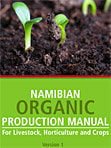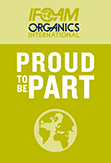NOA calls for the Right to Choose
22 Feb 2013: NOA calls for the Right to Choose – Label GMOs!
In light of recent concerns raised by the Namibian Consumer Trust, The Namibian Organic Association (NOA) urges the introduction of mandatory and comprehensive labelling for genetically engineered agricultural products in the Republic of Namibia. Mandatory and comprehensive labelling is necessary in order to ensure that the rights of consumers are protected since a rapidly growing number of consumers do not want to consume genetically engineered agricultural products.
“We are very concerned about the high levels of genetically modified organisms contained in processed maize products for sale on Namibian supermarket shelves as reported by the Namibian Consumer Trust,” says Manjo Smith, Chairperson of the Namibian Organics Association. “Our concern and objection is based on the worrying body of published, peer-reviewed scientific evidence from controlled animal studies carried out in many countries that demonstrates that GMOs cause a wide range of serious unexpected and unanticipated health problems,” she continues. Stakeholders who conduct this kind of research include governments, independent consumer bodies and corporations.
The Namibian Organics Association campaigns against the use of genetically modified ingredients in human and animal food and are against the commercial planting of GM crops in Namibia, a position shared by the organic movement worldwide. “Emerging evidence shows that if GM feed is given to animals, small traces of GM material appear in the resulting meat and dairy products. This raises serious human and animal health concerns about the use of GMOs in food, and also major ethical concerns about the fact that foods from GM-fed animals remain unlabelled,” Smith added.
NOA supports technologies that help produce food with care for human health, the environment and animal welfare, putting farmers in control of their own livelihoods. In the case of GM crops being planted, the opposite is true. Farmers are locked into buying costly herbicides and seed, while breeding resistant weeds and insects. GM crops are the product of a narrow, top-down approach driven not by the needs of farmers, consumers or the environment, but by the commercial interest of seed and chemical companies. Just three corporations – Monsanto, Syngenta, and Bayer – are responsible for virtually all commercially released genetically modified crops worldwide.
Farmers and consumers deserve to choose and actively pursue the kind of future they want for our food industry, the agricultural sector and arable land, as well as the risks they are willing to take in exercising that choice. But once GM crops become part of the environment and food production systems, they cannot be contained and our right to choice is denied.
It is therefore critical that regulators develop and adhere to safety checks in our food industry or even question whether new technologies are in the best interest of Namibian producers and consumers alike.
Choice through Organic Standards
The Namibian Organic Association is committed to the stringent implementation of Organic Standards. The production of GMO crops, or usage of any GMO products during processing is explicitly prohibited. This means, when consumers buy organically certified or organically approved products, it should be free of GMO ingredients.
Organic standards are the rules and regulations that define how an organic product must be produced. Any food labelled 'organic' that is for human and animal consumption must meet these standards as a minimum. The standards cover all aspects of food production, from animal welfare and wildlife conservation, to food processing and packaging. Labelling and adhering to production standards in the organic sector ensures that consumers are educated about what they are buying.
Organic standards ensure that you can be certain that you are buying a genuine organic product that has been produced in line with our principles. Imported organic foods must have been produced and inspected to internationally accepted standards such as EU organic regulations. There must also be full traceability of organic ingredients back to the producer.
How do you know it is organic?
The only way to be sure that a product is truly organic, is to look for the Certification or Organic Approval mark. Organic certification is the process whereby a farmer or processor applies for verification that their production is in compliance with a given set of organic standards and provides the end consumer with the guarantee that production has been in compliance with those standards.
In Namibia, look out for the “Namibian Organic” or “Namibian Organic-in-Conversion” mark. “Namibia Organic” means that the farm is fully compliant with the NOA Standards, and “Namibia Organic-in-Conversion” means that the farm is managed according to the standards, but is still in the 2-3 year conversion phase.
Members of the public are invited to a presentation entitled “GMO foods: blessing or a curse?" by the Namibian Organic Association on Thursday 28 February, 18:00 at the Namibian Scientific Society. E-mail info@noa.org.na for more information.
END.




